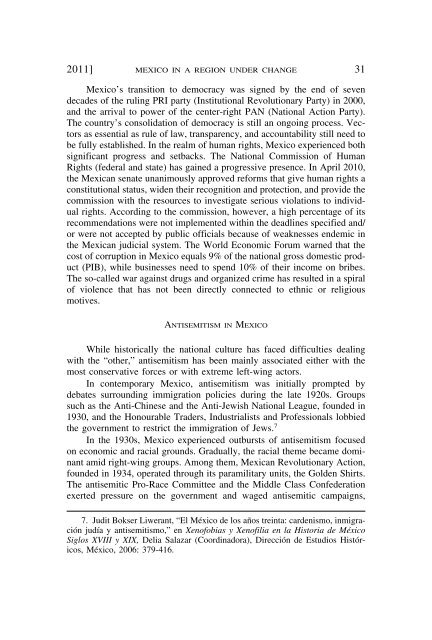JOURNALfor the STUDYof ANTISEMITISM
JOURNALfor the STUDYof ANTISEMITISM
JOURNALfor the STUDYof ANTISEMITISM
Create successful ePaper yourself
Turn your PDF publications into a flip-book with our unique Google optimized e-Paper software.
2011] MEXICO IN A REGION UNDER CHANGE 31<br />
Mexico’s transition to democracy was signed by <strong>the</strong> end of seven<br />
decades of <strong>the</strong> ruling PRI party (Institutional Revolutionary Party) in 2000,<br />
and <strong>the</strong> arrival to power of <strong>the</strong> center-right PAN (National Action Party).<br />
The country’s consolidation of democracy is still an ongoing process. Vectors<br />
as essential as rule of law, transparency, and accountability still need to<br />
be fully established. In <strong>the</strong> realm of human rights, Mexico experienced both<br />
significant progress and setbacks. The National Commission of Human<br />
Rights (federal and state) has gained a progressive presence. In April 2010,<br />
<strong>the</strong> Mexican senate unanimously approved reforms that give human rights a<br />
constitutional status, widen <strong>the</strong>ir recognition and protection, and provide <strong>the</strong><br />
commission with <strong>the</strong> resources to investigate serious violations to individual<br />
rights. According to <strong>the</strong> commission, however, a high percentage of its<br />
recommendations were not implemented within <strong>the</strong> deadlines specified and/<br />
or were not accepted by public officials because of weaknesses endemic in<br />
<strong>the</strong> Mexican judicial system. The World Economic Forum warned that <strong>the</strong><br />
cost of corruption in Mexico equals 9% of <strong>the</strong> national gross domestic product<br />
(PIB), while businesses need to spend 10% of <strong>the</strong>ir income on bribes.<br />
The so-called war against drugs and organized crime has resulted in a spiral<br />
of violence that has not been directly connected to ethnic or religious<br />
motives.<br />
<strong>ANTISEMITISM</strong> IN MEXICO<br />
While historically <strong>the</strong> national culture has faced difficulties dealing<br />
with <strong>the</strong> “o<strong>the</strong>r,” antisemitism has been mainly associated ei<strong>the</strong>r with <strong>the</strong><br />
most conservative forces or with extreme left-wing actors.<br />
In contemporary Mexico, antisemitism was initially prompted by<br />
debates surrounding immigration policies during <strong>the</strong> late 1920s. Groups<br />
such as <strong>the</strong> Anti-Chinese and <strong>the</strong> Anti-Jewish National League, founded in<br />
1930, and <strong>the</strong> Honourable Traders, Industrialists and Professionals lobbied<br />
<strong>the</strong> government to restrict <strong>the</strong> immigration of Jews. 7<br />
In <strong>the</strong> 1930s, Mexico experienced outbursts of antisemitism focused<br />
on economic and racial grounds. Gradually, <strong>the</strong> racial <strong>the</strong>me became dominant<br />
amid right-wing groups. Among <strong>the</strong>m, Mexican Revolutionary Action,<br />
founded in 1934, operated through its paramilitary units, <strong>the</strong> Golden Shirts.<br />
The antisemitic Pro-Race Committee and <strong>the</strong> Middle Class Confederation<br />
exerted pressure on <strong>the</strong> government and waged antisemitic campaigns,<br />
7. Judit Bokser Liwerant, “El México de los años treinta: cardenismo, inmigración<br />
judía y antisemitismo,” en Xenofobias y Xenofilia en la Historia de México<br />
Siglos XVIII y XIX, Delia Salazar (Coordinadora), Dirección de Estudios Históricos,<br />
México, 2006: 379-416.














